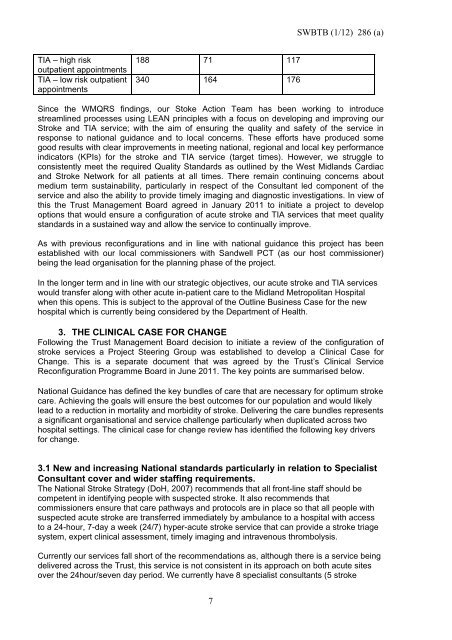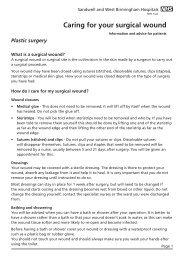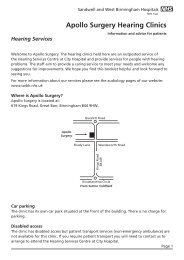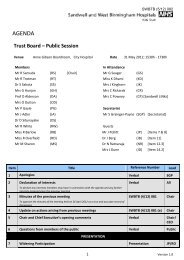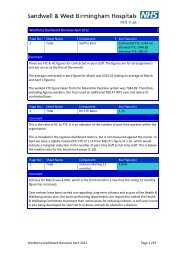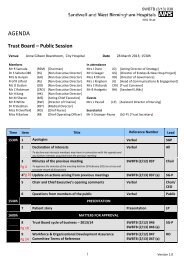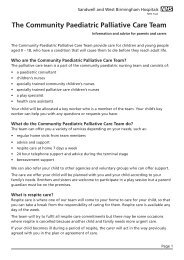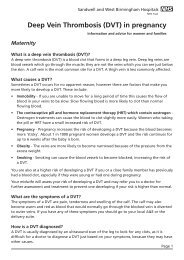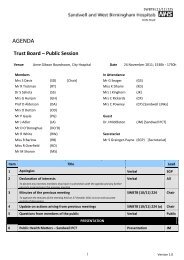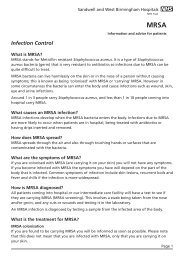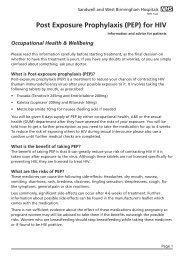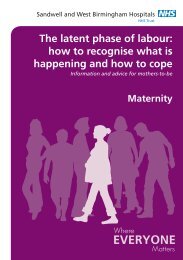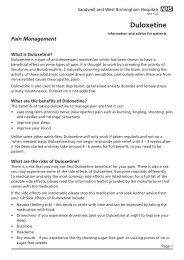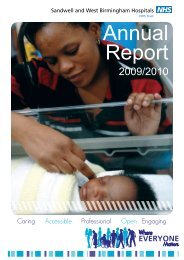January 2012 - Sandwell & West Birmingham Hospitals
January 2012 - Sandwell & West Birmingham Hospitals
January 2012 - Sandwell & West Birmingham Hospitals
You also want an ePaper? Increase the reach of your titles
YUMPU automatically turns print PDFs into web optimized ePapers that Google loves.
SWBTB (1/12) 286 (a)<br />
TIA – high risk<br />
outpatient appointments<br />
TIA – low risk outpatient<br />
appointments<br />
188 71 117<br />
340 164 176<br />
Since the WMQRS findings, our Stoke Action Team has been working to introduce<br />
streamlined processes using LEAN principles with a focus on developing and improving our<br />
Stroke and TIA service; with the aim of ensuring the quality and safety of the service in<br />
response to national guidance and to local concerns. These efforts have produced some<br />
good results with clear improvements in meeting national, regional and local key performance<br />
indicators (KPIs) for the stroke and TIA service (target times). However, we struggle to<br />
consistently meet the required Quality Standards as outlined by the <strong>West</strong> Midlands Cardiac<br />
and Stroke Network for all patients at all times. There remain continuing concerns about<br />
medium term sustainability, particularly in respect of the Consultant led component of the<br />
service and also the ability to provide timely imaging and diagnostic investigations. In view of<br />
this the Trust Management Board agreed in <strong>January</strong> 2011 to initiate a project to develop<br />
options that would ensure a configuration of acute stroke and TIA services that meet quality<br />
standards in a sustained way and allow the service to continually improve.<br />
As with previous reconfigurations and in line with national guidance this project has been<br />
established with our local commissioners with <strong>Sandwell</strong> PCT (as our host commissioner)<br />
being the lead organisation for the planning phase of the project.<br />
In the longer term and in line with our strategic objectives, our acute stroke and TIA services<br />
would transfer along with other acute in-patient care to the Midland Metropolitan Hospital<br />
when this opens. This is subject to the approval of the Outline Business Case for the new<br />
hospital which is currently being considered by the Department of Health.<br />
3. THE CLINICAL CASE FOR CHANGE<br />
Following the Trust Management Board decision to initiate a review of the configuration of<br />
stroke services a Project Steering Group was established to develop a Clinical Case for<br />
Change. This is a separate document that was agreed by the Trust’s Clinical Service<br />
Reconfiguration Programme Board in June 2011. The key points are summarised below.<br />
National Guidance has defined the key bundles of care that are necessary for optimum stroke<br />
care. Achieving the goals will ensure the best outcomes for our population and would likely<br />
lead to a reduction in mortality and morbidity of stroke. Delivering the care bundles represents<br />
a significant organisational and service challenge particularly when duplicated across two<br />
hospital settings. The clinical case for change review has identified the following key drivers<br />
for change.<br />
3.1 New and increasing National standards particularly in relation to Specialist<br />
Consultant cover and wider staffing requirements.<br />
The National Stroke Strategy (DoH, 2007) recommends that all front-line staff should be<br />
competent in identifying people with suspected stroke. It also recommends that<br />
commissioners ensure that care pathways and protocols are in place so that all people with<br />
suspected acute stroke are transferred immediately by ambulance to a hospital with access<br />
to a 24-hour, 7-day a week (24/7) hyper-acute stroke service that can provide a stroke triage<br />
system, expert clinical assessment, timely imaging and intravenous thrombolysis.<br />
Currently our services fall short of the recommendations as, although there is a service being<br />
delivered across the Trust, this service is not consistent in its approach on both acute sites<br />
over the 24hour/seven day period. We currently have 8 specialist consultants (5 stroke<br />
7


